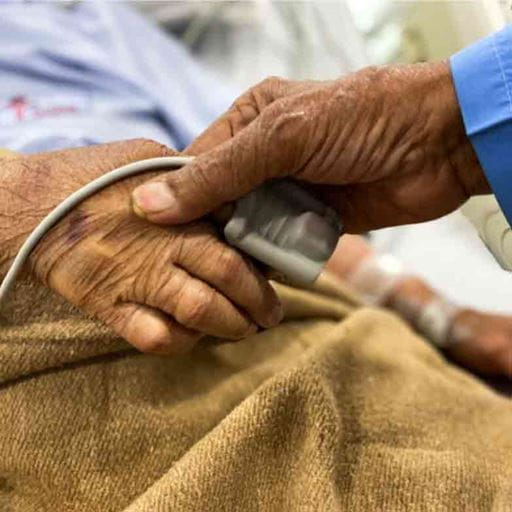Care home research shows residents are being denied access to healthcare
-
Date
Tue 16 May 23

Care home residents are being denied access to hospital treatment because of the incorrect use of Do Not Attempt CPR recommendations, according to Essex researchers.
Researchers have revealed evidence that Do Not Attempt CPR (DNACPR) recommendations are influencing healthcare decisions outside their intended remit, as reported by the BBC's Social Affairs Editor Michael Buchanan.
“Some residents are being inappropriately denied transfer to hospital or access to certain medicines. The best way to describe it is a form of ‘mission creep’ of DNACPR recommendations being used beyond their intended remit,” said Principal Investigator Professor Wayne Martin.
It’s estimated there are over 405,000 residents living in care homes across the UK. The number of those living with DNACPR recommendations is not recorded but cases such as that involving the death of a resident in Eastbourne show how DNACPRs are wrongly influencing medical decisions beyond CPR.
Professor Martin’s research group is calling for urgent reform of the process for making DNACPR recommendations and is designing improved training for care professionals and those advocating for care home residents.
The findings, published in the British Journal of Social Work, are based on an online survey of professionals working in care homes in England, conducted by the Essex Autonomy Project in 2021. 17% of respondents reported that they had witnessed DNACPR recommendations informing care and treatment decisions beyond cardiopulmonary resuscitation. More than half reported that DNACPR recommendations were made without consulting with the individual or their families.
In follow-up focus groups, one participant reported: “Some staff see ‘DNR’ as ‘do not care’, or ‘do not seek any medical treatment’.”
![Professor Wayne Martin]() "The best way to describe it is a form of 'mission creep' of DNACPR recommendations being used beyond their intended remit."
"The best way to describe it is a form of 'mission creep' of DNACPR recommendations being used beyond their intended remit."
“The COVID-19 pandemic and lockdowns provided a unique opportunity to document this misuse of DNACPRs but it’s clear from pre- and post-pandemic cases, such as that reported by the Senior Coroner for East Sussex in which a resident choked to death, that this was not a problem created by COVID and that it requires urgent attention,” Professor Martin added.
The survey was completed by 262 care professionals most of whom had responsibility for applying the Mental Capacity Act 2005.
The team’s findings have also provided evidence in support of Care Quality Commission claims concerning unlawful use of ‘blanket’ DNACPR recommendations without proper consultation in some care homes. Of those who completed the Essex-led survey, 56% reported new DNACPR decisions being recorded during the pandemic; 55% reported witnessing orders being added without consultation with the resident or family; and 28% reported DNACPR orders being added because of blanket decisions based on characteristics such as age.
There is also evidence of widespread confusion among professionals about the meaning and legal status of DNACPR recommendations with 66% at one training event led by the Essex researchers wrongly believing that DNACPR recommendations are legally binding.
The authors are calling for revisions to the DNACPR forms used in England and Wales.
“The forms used to record a DNACPR recommendation are more than an administrative record. They document what a DNACPR recommendation is, how those recommendations are made and how they should be applied. The sheer number of forms currently in circulation is unhelpful and shortcomings within them are perpetuating confusion and misunderstanding. An improved standardised form can play an important role in shaping and reinforcing best practice,” explained the lead author of the report, Dr Emily Fitton.
They are also calling for new standards, guidance and training for social work and capacity professionals who are often responsible for advocating for care home residents.
“New standards, guidance and training that focuses on the importance of individualised DNACPR recommendations made in consultation, that accurately outlines the legal status of DNACPRs, makes clear that DNACPR recommendations only apply to the use of CPR, and includes details of how to review decisions would better protect the human rights of care home residents,” Dr Fitton added.
The Survey of Care Home Professionals was part of the Human Rights in Care Homes project, and funded by the Arts and Humanities Research Council (AHRC) as part of the UK Research and Innovation (UKRI) COVID Rolling Call.
Read the full paper: Managing DNACPR Decisions in Residential Care: Towards Improved Training for Social Care and Capacity Professionals, written by Dr Emily Fitton and Professor Wayne Martin of the School of Philosophy and Art History, Dr Aaron Wyllie of the School of Health and Social Care, Professor Sabine Michalowski of Essex Law School, Dr Vivek Bhatt of Utrecht University and Dr Margot Kuylen of the British Medical Association.
)




